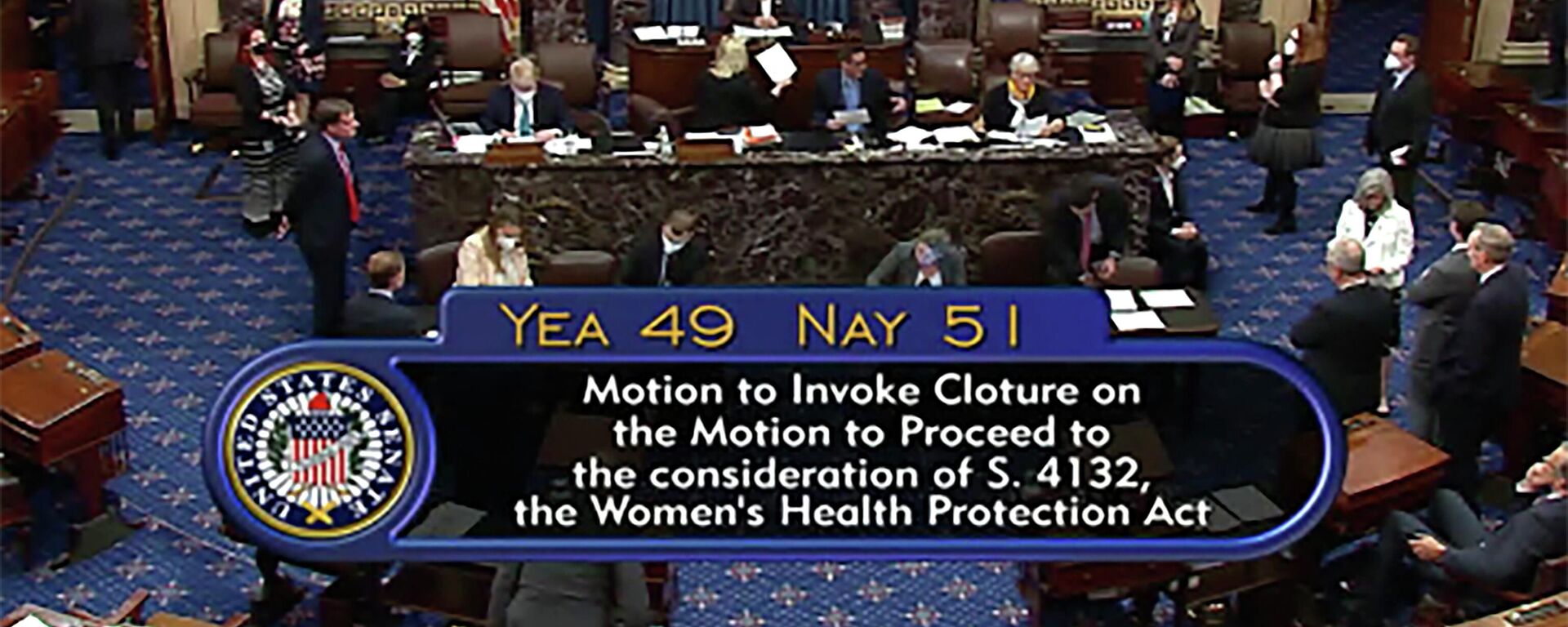https://sputnikglobe.com/20220615/in-jewish-law-abortion-is-required-if-necessary-florida-synagogue-challenges-states-15-week-ban-1096351478.html
‘In Jewish Law, Abortion is Required if Necessary’: Florida Synagogue Challenges State’s 15-Week Ban
‘In Jewish Law, Abortion is Required if Necessary’: Florida Synagogue Challenges State’s 15-Week Ban
Sputnik International
A synagogue in southern Florida is seeking to tip the tables in the debate over abortion in the United States, filing a new lawsuit claiming that restricting... 15.06.2022, Sputnik International
2022-06-15T17:57+0000
2022-06-15T17:57+0000
2022-06-15T17:59+0000
us
u.s. supreme court
abortion
florida
synagogue
jewish law
https://cdn1.img.sputnikglobe.com/img/07e6/01/09/1092140137_0:0:3072:1728_1920x0_80_0_0_bdb9c50d53d2ba307ede1f0e677c207b.jpg
The lawsuit, filed in the Leon County circuit court on Friday, says that House Bill 5, which Florida Governor Ron DeSantis signed into law in April and which takes effect on July 1, is unconstitutional. The law would ban abortions after the 15th week of pregnancy.The first amendment to the US Constitution says that “Congress shall make no law respecting an establishment of religion, or prohibiting the free exercise thereof,” a phrase that Christians have long used to argue that their religious objection to other people aborting their pregnancies gives them the right to legislate away that right. The shul’s suit turns that on its head.The suit was brought by Congregation L’Dor Va-Dor (From Generation to Generation) in Boynton Beach and argues that its members and others who “do not share the religious views reflected in the act will suffer … irreparable harm by having their religious freedom under the Florida Constitution violated.”“For Jews, all life is precious and thus the decision to bring new life into the world is not taken lightly or determined by state fiat,” the lawsuit says, according to the Miami Herald.The shul thus continues a line of attack against the anti-abortion offensive that includes 73 Forward, a pro-abortion initiative launched by the National Council for Jewish Women (NCJW) earlier this year. According to NJCW’s scholar-in-residence, Rabbi Danya Ruttenberg, the principle is one that for Jews goes back at least 2,000 years, with arguments in the Talmud - the central source of Jewish law - debating in which situations it is appropriate to abort a pregnancy.The Florida law is just one of several passed in recent years sharply restricting abortion access, and came as the country was awaiting the US Supreme Court’s decision on a case with the potential to overturn its previous decision in Roe vs. Wade. That 1973 ruling established the legal basis for abortion in the US, seeing it as part of a woman’s right to privacy.However, last month a court insider leaked a draft of the awaited decision, revealing the conservative-majority court’s intention to strike down the Roe decision by arguing it had created a right not explicitly delineated in the US Constitution. The news provoked widespread protests and calls for a new abortion rights movement for women and transgender men, who also need abortions and face additional barriers to getting them.If the high court strikes down the right to an abortion, 13 conservative-dominated US states would immediately ban abortion altogether thanks to so-called “trigger laws,” while another 13 - including Florida - are likely to ban it after Roe is removed, according to the Guttmacher Institute, a New York-based sexual and reproductive health and rights think tank. Other states where liberal politicians hold more sway are likely to continue to protect abortion access, with some states and the District of Columbia even passing new measures to expand that access and compensate for people traveling there from states where it’s banned.
https://sputnikglobe.com/20220511/us-senate-blocks-bill-codifying-abortion-rights-into-law-amid-roe-v-wade-scotus-fallout-1095444293.html
florida
Sputnik International
feedback@sputniknews.com
+74956456601
MIA „Rossiya Segodnya“
2022
Sputnik International
feedback@sputniknews.com
+74956456601
MIA „Rossiya Segodnya“
News
en_EN
Sputnik International
feedback@sputniknews.com
+74956456601
MIA „Rossiya Segodnya“
Sputnik International
feedback@sputniknews.com
+74956456601
MIA „Rossiya Segodnya“
us, u.s. supreme court, abortion, florida, synagogue, jewish law
us, u.s. supreme court, abortion, florida, synagogue, jewish law
‘In Jewish Law, Abortion is Required if Necessary’: Florida Synagogue Challenges State’s 15-Week Ban
17:57 GMT 15.06.2022 (Updated: 17:59 GMT 15.06.2022) A synagogue in southern Florida is seeking to tip the tables in the debate over abortion in the United States, filing a new lawsuit claiming that restricting abortion access violates their religious freedom as Jews.
The lawsuit, filed in the Leon County circuit court on Friday, says that House Bill 5, which Florida Governor Ron DeSantis
signed into law in April and which takes effect on July 1, is unconstitutional. The law would ban abortions after the 15th week of pregnancy.
The
first amendment to the US Constitution says that
“Congress shall make no law respecting an establishment of religion, or prohibiting the free exercise thereof,” a phrase that Christians have long used to argue that their religious objection to other people aborting their pregnancies gives them the right to legislate away that right. The shul’s suit turns that on its head.
The suit was brought by Congregation L’Dor Va-Dor (From Generation to Generation) in Boynton Beach and
argues that its members and others who “do not share the religious views reflected in the act will suffer … irreparable harm by having their religious freedom under the Florida Constitution violated.”
“For Jews, all life is precious and thus the decision to bring new life into the world is not taken lightly or determined by state fiat,” the lawsuit says, according to the
Miami Herald.
“In Jewish law, abortion is required if necessary to protect the health, mental or physical well-being of the woman, or for many other reasons not permitted under the act. As such, the act prohibits Jewish women from practicing their faith free of government intrusion and thus violates their privacy rights and religious freedom,” it explains.
The shul thus continues a line of attack against the anti-abortion offensive that includes
73 Forward, a pro-abortion initiative launched by the National Council for Jewish Women (NCJW) earlier this year. According to NJCW’s scholar-in-residence, Rabbi Danya Ruttenberg, the principle is one that for Jews goes back at least 2,000 years, with arguments in the Talmud - the central source of Jewish law - debating in which situations it is appropriate to abort a pregnancy.
“Many secular conversations center on the question of whether abortion is a right. But in Judaism, we talk about responsibilities - to one another, and to God. For me, defending abortion is about our broader ethical and spiritual obligations, as well as the specific ones prescribed by Jewish law,” she
wrote in the Atlantic on Tuesday. “[I]f and when the Supreme Court reverses its Roe v. Wade decision, as it’s expected to, we must remember that for many people, safe and accessible abortion is a religious value.”
The Florida law is just one of several passed in recent years sharply restricting abortion access, and came as the country was awaiting the US Supreme Court’s decision on a case with the potential to overturn its previous decision in Roe vs. Wade. That 1973 ruling established the legal basis for abortion in the US, seeing it as part of a woman’s right to privacy.
However, last month a
court insider leaked a draft of the awaited decision, revealing the conservative-majority court’s intention to strike down the Roe decision by arguing it had created a right not explicitly delineated in the US Constitution. The news
provoked widespread protests and calls for a new abortion rights movement for women and transgender men, who also need abortions and face additional barriers to getting them.
If the high court strikes down the right to an abortion, 13 conservative-dominated US states would immediately ban abortion altogether thanks to so-called “trigger laws,” while another 13 - including Florida - are likely to ban it after Roe is removed,
according to the Guttmacher Institute, a New York-based sexual and reproductive health and rights think tank. Other states where liberal politicians hold more sway are likely to continue to protect abortion access, with some states and the District of Columbia even passing new
measures to expand that access and compensate for people traveling there from states where it’s banned.


